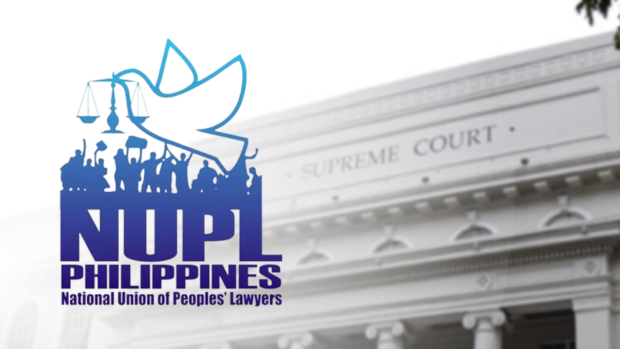NUPL says Anti-Terror Act rules set by SC still flawed

INQUIRER FILE PHOTO
MANILA, Philippines — A lawyers’ union said that the rules on the Anti-Terrorism Act set by the Supreme Court will not fully address its flaws.
According to the National Union of Peoples Lawyers (NUPL), the “Rules on the Anti-Terrorism Act (ATA) of 2020 and Related Laws” set by the Supreme Court on January 2 “cannot address, much less cure” the flaws of the law.
“As initial observation, the NUPL notes well efforts by the Supreme Court to provide judicial safeguards and remedies under the challenged Anti-Terrorism Act of 2020 in its recently-issued Special Rules of Procedure on Anti-Terrorism Cases,” the NUPL said.
“Having said that, we respectfully maintain that these Rules by their nature cannot address, much less cure, the fundamental flaws of the law which we continue to assail as perilous to civil liberties,” it continued.
The NUPL said that the Rules did not clarify that the preventive freeze orders on funds and properties of persons or groups alleged to finance terrorism is automatically lifted after a 20-day lapse.
Article continues after this advertisement“However, we regret that the Rules was unable to clarify that the preventive freeze orders on funds or properties of proscribed persons or groups related to financing of terrorism is automatically lifted after the lapse of 20 days.”
Article continues after this advertisementIn this connection, we note the practice of banks to refuse the lifting of freeze orders sans clearance from the AMLC despite the lapse of the 20-day period in which said order only takes effect. We have also noted a clear setback in making the notice to the respondent requirement optional in cases of extension of preventive freeze orders,” the NUPL said.
The group also found issues in the judicial remedy for a person to question his or her designation as a terrorist in the form of a petition for certiorari.
“Also, the judicial remedy to question one’s designation as a “terrorist” in the form of a petition for certiorari before the Court of Appeals comes in an abbreviated period of 20 calendar days from the date of publication (of the designation) in various platforms (newspaper of general circulation, online Official Gazette, or on the official website of the Anti-Terrorism Council) “whichever is earlier,” which is tricky in itself,” the NUPL continued.
“Moreover, the reiteration of confidentiality rules in amorphous national security claims or “state secrets” in terrorism-related cases continue to frustrate some of the remedies for aggrieved parties and respondents as the inability to access so-called intelligence information poses the most significant risk.”
NUPL added that it will “remain vigilant” as the anti-terror law is implemented.
“As the terror law is implemented, the NUPL will remain vigilant as it continues to monitor how the law is weaponized against dissenters, navigate through the maze of the Rules even as we challenge the charges against our clients in the proper fora, and pursue at the ripe time and appropriate grounds strategic litigation to assail anew the law that continues to put legitimate political activity in the crosshairs of arbitrary State power,” it added.